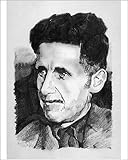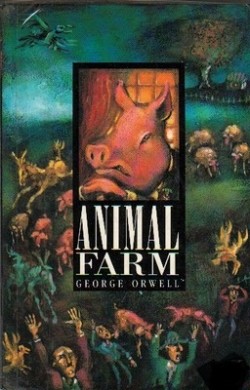Animal Farm: A Fairy Story (1945) by George Orwell
Rating: 




“All animals are equal, but some animals are more equal than others” 

George Orwell (1903- 1950) was keenly aware of the injustices and poverty in Britain during the 1930’s. He knew that the class system meant many of the upper and middle class viewed the working class in terms not unlike animals. In The Road to Wigan Pier he observed: “The train bore me away, through the monstrous scenery of slag-heaps, chimneys, scrap-iron, foul canals, paths of cindery mud criss-crossed by the prints of clogs. As we moved slowly through the outskirts of the town we passed row after row of little grey slum houses running at right angles to the embankment. At the back of one of the houses a young woman was kneeling on the stones, poking a stick up the leaden waste-pipe which ran from the sink inside, and which I suppose was blocked. I had time to see everything about her- her sacking apron, her clumsy clogs, her arms reddened by the cold. She looked up as the train passed, and I was near enough to catch her eye. She had a round, pale face, the usual exhausted face of the slum girl who is twenty-five and looks forty, thanks to miscarriages and drudgery; and it wore, for the second in which I saw it, the most desolate, hopeless expression I have ever seen. It struck me then that we are mistaken when we say that ‘it isn’t the same for them as it would be for us’, and that people bred in the slums can imagine nothing but the slums. For what I saw in her face was not the ignorant suffering of an animal. She knew well enough what was happening to her- understood as well as I did how dreadful a destiny it was to be kneeling there in the bitter cold, on the slimy stones of a slum back-yard, poking a stick up a foul drain-pipe.”
The book ‘Animal Farm’ is subtitled: ‘A fairy story’ and George Orwell uses the fable in extended form to create a world at once unreal yet recognizable as an allegorical warning to contemporaries. Orwell draws a pessimistic picture of a Stalinist dictatorship sustained by an apathetic, ignorant, or a frightened populace with little choice but to support the rebellion. The satirical novel Nineteen Eighty-four , published in 1949, likewise painted a picture of dehumanized society under totalitarian rule..
Old Major, an elderly boar, knowing his death to be imminent, calls a meeting of all the animals on Manor farm to pass on his lifetime’s wisdom. His message is one of revolution, and it does not take much to persuade his animal audience that they have been abused and exploited for too long.
A few days later, Old Major dies, but the seeds of rebellion have been planted, so that when one day the drunken farmer neglects to feed the livestock, they break into the store-shed. When the farm workers attack them with whips, the animals chase the humans from the farm. The pigs, who ever since Old Major’s speech, have been planning for this eventuality, assume the role of leaders and set about organising the other animals into a co-operative workforce, so that the symbolically re-named ‘Animal Farm’ can function without the intervention of man. The animals accept this and submit to the pigs, without considering the consequences, even as the pigs from the start award themselves privileges.
The humans attempt to invade but are repulsed by a united effort, during which Snowball displays extraordinary heroism. Later, another pig, Napoleon, ambitious for supreme power, stages a coup , during which Snowball, eloquent, innovative, and a threat to Napoleon’s planned dictatorship, is set upon by a pack of dogs secretly under Napoleon’s command. Fleeing the farm, he is subsequently denounced by Squealer, in charge of propaganda. Snowball’s plans for building a windmill, initially derided by Napoleon, are put into effect, however, the effort in building it result in shortages, which Napoleon attempts to resolve by trading with neighbouring farms. The pigs further detach themselves from the other animals by moving into the farmhouse.
Following the destruction of the windmill in a storm, Snowball is inevitably blamed. Animal turning upon animal, any suspected Snowball sympathisers are killed. A second windmill is built, but Frederick, a local farmer who successfully defrauded Napoleon in a business deal, underhandedly destroys it. Several animals die in the fighting that follows, but the men are badly beaten and make no decisive attack. Napoleon orders a third windmill to be built, and work commences immediately, but Boxer, a horse whose industry and dedication have been an example to the entire workforce, collapses as a result of injuries sustained during the recent fighting, as well as sheer over-work. The pigs sell him to a glue factory whilst the rest of the working animals are reassured by Squealer’s propaganda that he was being well cared for in a neighbouring hospital, but sadly died a peaceful death.
Step by step, the tenets of the revolution are eroded to the point the pigs take up walking on their hind legs, sleeping in the farmhouse beds, and using whips. Humans are invited to the farm, and are fed and entertained in the farmhouse. As they look through the window, the animals realise they can no longer distinguish between the faces of the pigs and the men. Instead of true freedom, they had exchanged one tyranny for another.
The message in the story has all the parallels Orwell intended, for although there was potential for positive change following the 1917 Russian revolution, the results were depressing. The workers may often be perplexed, but accept with little murmur what they are told, thus becoming ideal candidates for manipulation. What is it about human nature and society that permits such tyranny? For more recent times, what other lessons can be drawn from ‘Animal Farm’?
Take for example, the threat of nuclear war and the dangers of the international arms race, long recognized, protests and warnings sounding forth for many years. In 1964, nearly 50 years ago, two eminent American scientists who served as presidential advisers pointed out the folly of the arms race this way: “Both sides in the arms race are thus confronted by the dilemma of steadily increasing military power and steadily decreasing national security. . . The clearly predictable course of the arms race is a steady open spiral downward into oblivion.” In other words, the more the nations arm themselves, the less secure they will feel, and the end result is catastrophe.
Likewise, for years environmentalists have been decrying the devastating effects of technological development on air, water, soil, and plant and animal life. But the lure of profit and higher living standards has proved to be far more appealing. People rationalize that if a project creates jobs and profits, then whatever environmental damage or health hazard it may produce can be overlooked. The resulting serious problems, such as acid rain, depletion of the ozone layer, increase of carbon dioxide in the atmosphere and disposal of nuclear and toxic waste threaten us all. The net result is the potential breakdown of the entire life-supporting system of the earth.
In the realm of politics, of every colour, the story warns of the use of propaganda, plain lies and over-optimistic reports that things are not as bad as they seem, or better than the past, creation of leaders that cannot be questioned, loyal supporters treated dishonourably. The moral message of Orwell brings up to date the tradition in England of Bunyan, Defoe, Swift, Dickens, Carlyle and others.
During the Second World War, the main Soviet censorship body, Glavlit, employed seventy thousand full-time staff not only to eliminate any undesirable printed materials, but also “to ensure that the correct ideological spin was put on every published item”. Telling anything against the “Party line” was punished by imprisonment and forced labour. “Today a man only talks freely to his wife – at night, with the blankets pulled over his head”, said writer Isaac Babel.
According to The Great Terror: A Reassessment by Robert Conquest, “All in all, unprecedented terror must seem necessary to ideologically motivated attempts to transform society massively and speedily, against its natural possibilities. The accompanying falsifications took place, and on a barely credible scale, in every sphere. Real facts, real statistics, disappeared into the realm of fantasy.’’
In a way, the lesson of ‘man’s dominion over man’ is addressed in the Bible book of Jonah. The tyrannical Assyrians were given a warning sent by God: “For my part, ought I not to feel sorry for Nineveh the great city, in which there exist more than one hundred and twenty thousand men who do not at all know the difference between their right hand and their left, besides many domestic animals?” (Jonah 4:11)
Sources: The Readers Companion to the Twentieth Century Novel
Reference Guide to English Literature
Drabble M, A Writer’s Britain
With thanks





